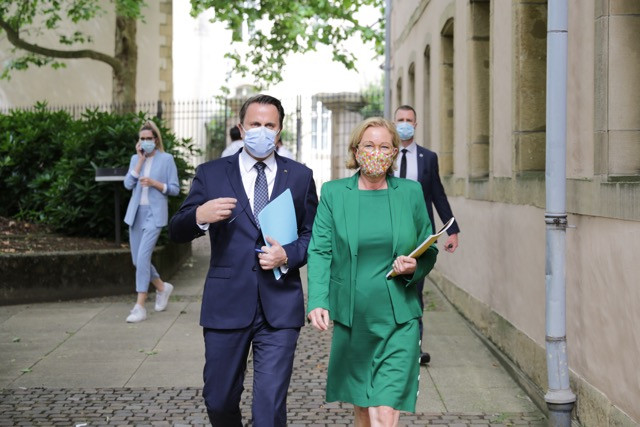As the number of weekly tests carried out in the grand duchy approaches 100,000, health minister Paulette Lenert (LSAP) on Wednesday gave the media an overview of infection rates and measures the government was taking to manage the second wave of the pandemic.
The minister said that 94,031 tests had been conducted in the week from 13 to 19 July, compared to 64,952 the previous week. Those tests had revealed 684 infections, up from 402. Just 13% of those cases however resulted from the large-scale testing programme. The number of contact tracing tests had more than doubled, from 1,521 to 3,121.
Lenert said that some 33 clusters--that is when at least three people have been infected over a seven-day period in the same place--had been identified. 12 clusters were found in schools, 5 in the healthcare sector, 6 in the construction, 3 in the hospitality sector and others in nursing homes, in industrial businesses and a house-share.
Some 2,175 people are currently in quarantine--which means that have had high-risk contact with a person with a confirmed infection and must stay at home for 7 days. They face a fine of €450 if they do not comply. A further 876 infected people have been placed in isolation on the recommendation of a physician. They must stay at home for at least 14 days after the onset of symptoms and must avoid contact with other people and wear a surgical mask whenever they are in the presence of others.
On Wednesday evening, the ministry’s daily 24-hour update reported 129 new infections--113 residents and 16 cross border workers--resulting from a total 19,073 tests.
Lenert said that contact tracing by telephone continues to be the government’s strategy in containing spread of the virus. The tracing team currently consist of 85 people, with more staff being trained to join them. The health service hotline is currently manned by a staff of seven who are mostly answering questions about testing for residents who want to travel abroad to countries that require it. That team will be boosted by a further three this week and another 40 staff are being trained in case they are needed.
“The situation is under control, after a little alert,” Lenert said. “We have hired more staff and we have the situation in hand again. But we cannot exclude bottlenecks.” She said speed was of the essence in obtaining test results, tracing and speaking to contacts and isolating those who have tested positive.
The ministers also revealed that the average age of patients being treated for covid-19 in hospital continues to fall and is now at 57 years old. “The trend shows that young people are being more affected than at the start of the pandemic,” said Lenert. Indeed, three-quarters of people who are currently in quarantine are under 45 years old.
